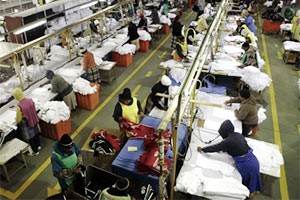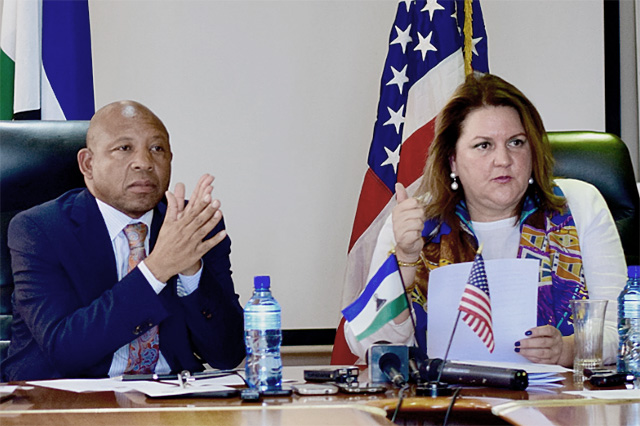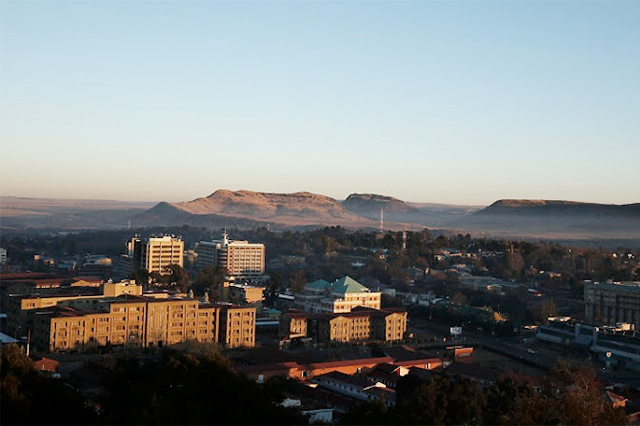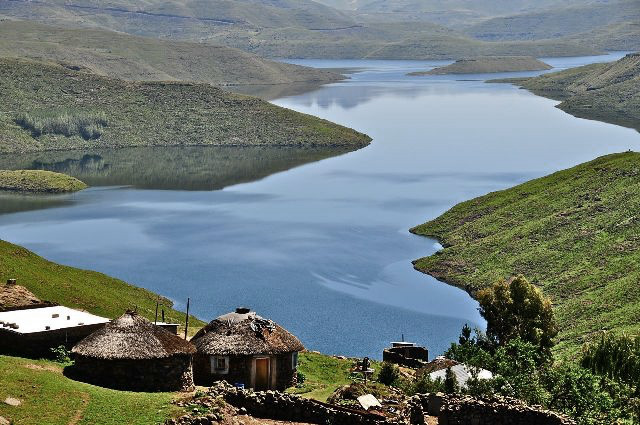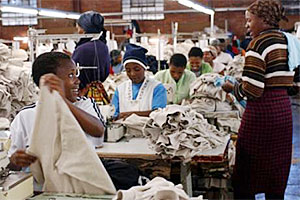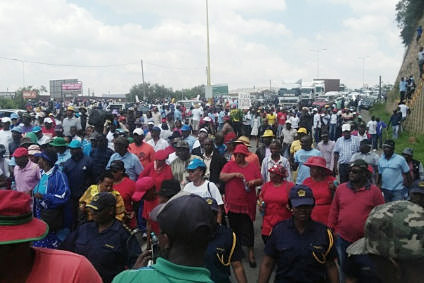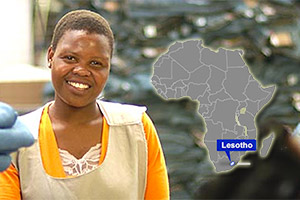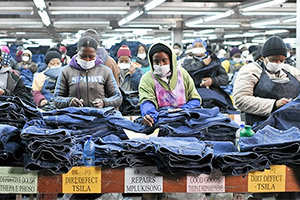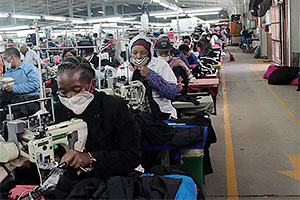Is Lesotho's garment industry an 'ethical alternative'?
With just over two million inhabitants, the southern African kingdom of Lesotho is one of the world’s smallest countries.
A low-income country that currently ranks 160 out of 187 on the UN’s Human Development Index, workers earn an average salary of US$570 per annum and some 42 per cent of its citizens are jobless.
However, over the last eight years, its textile and garments manufacturing industry has grown to become one of Africa’s biggest.
At its peak in 2008, Lesotho’s garment and textile exports totalled US$340 million.
The introduction of the African Growth and Opportunities Act (AGOA) by the United States government in 2000 provided Lesotho (and other participating countries) with preferential access to the US market.
Fifteen years later and Lesotho’s garment industry contributes 20 per cent to the country’s GDP.
In addition, 80 per cent of Lesotho’s garments are manufactured for US mega-brands such as Gap, Levi Strauss and Wal-Mart.
As a result, the growth of Lesotho’s textile industry has brought various benefits to workers on the factory floor.
Thirty-four-year-old Teboho Moeti is tasked with pressing steam irons over rows of casual denim shirts at Formosa Denim Mill in Maseru.
For Teboho, who comes from a small village 200 miles away, his job is ‘precious’.
“I didn’t go to school much but I earn US$420 every month ironing new shirts,” he tells Equal Times.
Teboho’s salary, which includes bonuses and other benefits, is well above the sectoral minimum wage of US$92 a month, and demonstrates that in many ways, the conditions in Lesotho’s textiles industry are more favourable than those endured by garment workers in Asia.
In factories from Cambodia to Bangladesh, garment workers face low wages, dangerous working conditions, few labour rights and, in extreme cases, forced labour and child labour.
In Lesotho, 40,000 mainly female workers are employed in 40-odd modern factories, and are protected by a raft of labour laws.
“Anyone under the age of 18 years is banned from working in the garment factories. They are not even allowed to scrub decks,” says Pilani Beletho, a factory inspector in Lesotho.
Lesotho also has one of the world’s highest HIV infection rates (23.1 per cent of the adult population is HIV-positive), which has taken its toll on garment workers. But a number of initiatives, such as the Apparel Lesotho Alliance to Fight AIDS, work on the prevention and holistic treatment of workers living with HIV/Aids.
Maternity leave
But unions point to a number of other issues regarding the country’s largest private sector employer.
While Lesotho labour law makes provisions for holiday leave, sick pay, pensions and injury compensation, these rights are not always guaranteed.
Thabo Tshabalala, a regional officer at IndustriAll-Africa points to the issue of maternity leave, which is a major concern given the industry’s young, mainly female workforce.
“Pregnant workers frequently lose their jobs,” he says.
Many garment workers have to stand for their entire nine-hour shift doing physically demanding work, and this often continues even when workers become pregnant.
And while recent labour law changes now allow pregnant workers to take six weeks maternity leave, many people are unaware of these amendments and only take two weeks.
Then there is the issue of wages.
“Yes, we have a starting [sectoral] wage but US$92 is a shame. It is a poverty wage,” says Tshabalala.
“Workers in China earn more than [they do in] Lesotho.”
And while freedom of association is respected in theory, there are often serious obstacles with regards to union membership.
Pepe [he refused to give his real name in case of reprisals] was representing a worker whose fingers were burnt by an industrial clothes press.
“I was bluntly told [by my employers] to choose between my job and the trade union,” he told Equal Times.
This kind of intimidation goes some way to explain why only 58 per cent of Basotho textiles workers are represented by unions, according to the Lesotho Amalgamated Clothing and Textiles Workers Union.
Health and safety is also still a big issue in Lesotho’s garment factories.
The country’s high altitude means that it can be very cold and workers frequently complain of not being warm enough on the factory floor.
“We need jackets and wool fleeces in winter,” says Mzi Dakatho, a yarn cotton spinner.
“But if we complain too much sometimes supervisors call us ‘devils’.”
Labour inspectors have also recorded other major health and safety infractions: poor ventilation; not enough fire exits; the unsafe storage and use of chemicals and clothes dyes; and the under-supply of face masks (required to protect workers from dust, fumes and fibres).
Better Work Lesotho
Since 2010, Better Work Lesotho, an initiative of the International Labour Organization (ILO) and the International Finance Corporation (IFC), has been working to improve conditions for factory workers by monitoring adherence to core ILO labour standards and national labour laws, and improving the relationship between workers and factory management.
To date, Better Work Lesotho has negotiated employee health and sanitation inspections with 22 garment factories in the country.
Alex Jo Seng, from Taiwan, owns the Manuk Garment Embroidery Factory. He admits: “I didn’t know the importance of fire drills and steam boiler inspections until Better Work Lesotho visited. I have up to 300 workers. I want to expand safety provisions for my labourers. Even my technicians from Taiwan must be trained on ethics and employee safety.”
But while factory owners accept the importance of adhering to safety standards in principle, they are very clear about their priorities.
“Profits are uppermost in our minds. Nothing else,” says Zing Tor Weibo a factory exports manager from China.
And with AGOA expiring later this year, these profits could be in serious jeopardy.
Experts are worried that Lesotho will find it difficult to compete on the global market without the act, and like other AGOA beneficiaries, Lesotho is actively lobbying the US to extend the agreement by another 15 years.
But AGOA is not a magic pill. Concerns have also been expressed that the trade generated by AGOA has been more beneficial to foreigners than it has been to locals.
All of the Lesotho’s garment factories are owned by Chinese or Taiwanese migrants, leaving commentators to wonder how much genuine economic transformation these investments really bring to the country.
“It’s a fragile success,” says Tshabalala.
“If there is an economic downturn in Lesotho like what we saw in Greece, these factory owners could easily withdraw their money and jump ship back to their home countries.”
But ultimately, the economic boost delivered by AGOA to Lesotho’s economy has been crucial, he says. Without it, the garment industry in this small African nation will struggle to survive.
“Millions of dollars will be added as duty on shoes and textiles coming from Lesotho, making them expensive, if not unsellable. If AGOA is not renewed in September, jobs in Lesotho may crumble.”


